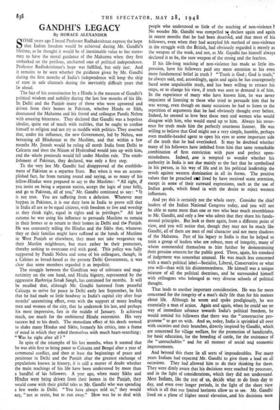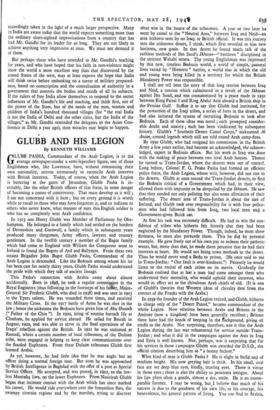GANDHI'S LEGACY
By HORACE ALEXANDER
SOME years ago I heard Professor Radhakrishnan express the hope that Indian freedom would be achieved during Mr. Gandhi's lifetime, as he thought it would be of inestimable value to her states- men to have the moral guidance of the Mahatma when they first embarked on the perilous, uncharted seas of political independence. Professor Radhakrishnan's hope was fuffilled, but only just. And it remains to be seen whether the guidance given by Mr. Gandhi during the first months of India's independence will keep the ship of state in safe channels during the inevitably difficult years that lie ahead.
The fact of his assassination by a Hindu is the measure of Gandhi's political wisdom and nobility during the last few months of his life. In Delhi and the Punjab many of those who were uprooted and driven from their homes in Pakistan, whether Hindu or Sikh, denounced the Mahatma and his friend and colleague Pandit Nehru with amazing bitterness. They declared that Gandhi was a hopeless idealist, quite out of touch with realities, that he ought to confine himself to religion and not try to meddle with politics, They asserted that, under his influence, the new Government, led by Nehru, was betraying all Hindustan to the Muslims, and that within a few months Mr. Jinnah would be ruling all north India from Delhi to Calcutta and then the Nizam of Hyderabad would join up with him, and the whole peninsula would fall under Muslim rule. The estab- lishment of Pakistan, they declared, was only a first step.
To the very last Mr. Gandhi had disapproved of the establish- ment of Pakistan as a separate State. But when it was an accom- plished fact, far from turning round and saying, as so many of his fellow-Hindus were prepared to say to the Muslims: "All right, if you insist on being a separate nation, accept the logic of your folly, and go to Pakistan, all of you," Mr. Gandhi continued to say : "It is not true. You are suffering from a delusion. Whatever may happen in Pakistan, it is our duty here in India to prove still that in India all are to be equal citizens, with freedom to live and worship as they think right, equal in rights and in privileges." All last autumn he was using his influence to persuade Muslims to remain in their homes or to return to their homes in Delhi and the Punjab. He was constantly telling the Hindus and the Sikhs that, whatever they or their families might have suffered at the hands of Muslims in West Punjab or elsewhere, they must not take vengeance on their Muslim neighbours, but must rather be their protectors, thereby seeking to overcome evil with good. This policy was fully supported by Pandit Nehru and some of his colleagues, though, in a Cabinet as broad-based as the present Delhi Government, it was clear that some members regarded it as impolitic.
The struggle between the Gandhian way of tolerance and mag- nanimity on the one hand, and Hindu bigotry, represented by the aggressive Rashtriya Sevak Sangh, has continued for months. It will be recalled that, although Mr. Gandhi hastened from peaceful Calcutta to strive for peace in Delhi early last September, he felt that he had made so little headway in India's capital city after four months' unremitting effort, even with the support of many leading men and women of the city, that he undertook his last, and perhaps his most impressive, fast in the middle of January. It achieved much, too much for the embittered Hindu extremists. His very success led to his death. The immediate effect of his death seemed to shake many Hindus and Sikhs, formerly his critics, into a frame of mind in which they asked themselves with much heart-searching: "Was he right after all ? "
In spite of the triumphs of his last months, when It seemed that he was able first to bring peace to Calcutta and Bengal after a year of communal conflict, and then at least the beginnings of peace and penitence in Delhi and the Punjab after the greatest exchange of populations known in history, it is still a matter of doubt whether the main teachings of his life have been understood by more than a handful of his followers. A year ago, when many Sikhs and Hindus were being driven from their homes in the Punjab, they would come with their pitiful tales to Mr. Gandhi who was spending a few weeks in Delhi. "You have always told us," they would say, "not to resist, but to run away." How was he to deal with
people who understood so little of the teaching of non-violence ? No wonder Mr. Gandhi was compelled to declare again and again in recent months that he had been deceived, and that most of his followers, even when they had accepied his method of non-violence in the struggle with the British, had obviously regarded it merely as the weapon of the weak, and not, as Mr. Gandhi has himself always declared it to be, the sure weapon of the strong and the fearless.
If his life-long teaching of non-violence has made so little im- pression, have his followers paid any more attention to his even more fundamental belief in truth ? "Truth is God ; God is truth," he always said, and, accordingly, again and again he has courageously faced some unpalatable truth, and has been willing to retrace his steps, or to change his view, if truth was seen to demand it of him. In the experience of many who have known him, he was never impatient of listening to those who tried to persuade him that he was wrong, even though on many occasions he had to listen to the repetition of arguments that he had obviously thought over before. Indeed, he seemed to love best those men and women who would disagree with him, who would stand up to him. Always his rever- ence for truth made him the perfectly courteous listener. He was willing to believe that God might use a very simple, humble, perhaps even muddle-headed agent to open his eyes to some important side of the truth that he had overlooked. It may be doubted whether many of his followers have imbibed from him that same remarkable ,combination of firm conviction with pure and perfect open- mindedness. Indeed, one is tempted to wonder whether his authority in India is not due mainly to the fact that he symbolised in his person, in his way of life and in his political leadership the revolt against western domination in all its forms. The positive values that he preached awl lived by have received scant attention, except in some of their outward expressions, such as the use of Indian goods, which fitted in with the desire to reject western influences.
And yet this is certainly not the whole story. Consider the chief leaders of the Indian National Congress today, and you will not be able to name more than one or two who bear much resemblance to Mr. Gandhi, and only a few who admit that they share his funda- mental principles. But look at them again, from a different point of view, and you will notice that, though they may not be much like Gandhi, all of them are men of real character and not mere shadows of the Mahatma. Part of his legacy to India is that he helped to train a group of leaders who are robust, men of integrity, many of whom commended themselves to him further by demonstrating their genuine concern for the public good. There, again, his standard of judgement was somewhat unusual. He was much less concerned with a man's political label—Socialist, Liberal, Conservative or what you will—than with his disinterestedness. He himself was a unique mixture of all the political doctrines, and he surrounded himself with colleagues who belonged to very diverse schools of political thought.
That leads to another important consideration. He was far more concerned for the integrity of a man's daily life than for his notions about life. Although he wrote and spoke prodigiously, he was essentially a man of action. Again and again, when he could see no way of immediate advance towards India's political freedom, he would remind his followers that there was the "constructive pro- gramme" to get on with. And so, today, India is sprinkled all over with societies and their branches, directly inspired by Gandhi, which are concerned for village welfare, for the promotion of handicrafts, for basic education, for the breeding of cattle, for the assistance of the " untouchables " and for all manner of social and economic improvements.
And beyond this there lie all sorts of imponderables. For many years Indians had expected Mr. Gandhi to give them a lead on all occasions. They had allowed him to do their thinking for them. They were dimly aware that his decisions were reached by processes, and in the light of considerations, which they did not understand. Most Indians, like thc rest of us, decide what to do from day to day, and even over longer periods, in the light of the short view which is all that our limited horizons allow us to see. Mr. Gandhi lived on a plane of higher moral elevation, and his decisions were
accordingly taken in the light of a much larger perspective. Many in India are aware today that the world expects something more than the ordinary short-sighted improvisations from a country that has had Mr. Gandhi for its leader for so long. They are not likely to achieve anything very impressive at once. We must not demand it of them.
But perhaps those who have attended to Mr. Gandhi's teaching for years, and who have hoped that his faith in non-violence might show the world a more excellent way than that discovered by the armed States of the west, may at least express the hope that India will think twice before embarking on a career of military prepared- ness, based on conscription and the centralisation of authority in a government that controls the bodies and minds of all its subjects. If the rulers of free India allow themselves to respond to the secret influences of Mr. Gandhi's life and teaching, and think first, not of the power of the State, but of the needs of the men, women and children of India's hundred thousand villages (for "the real India is not the India of Delhi and the other cities, but the India of the villages," as Mr. Gandhi reminded the delegates to the Asian Con- ference in Delhi a year ago), then miracles may begin to happen.































 Previous page
Previous page